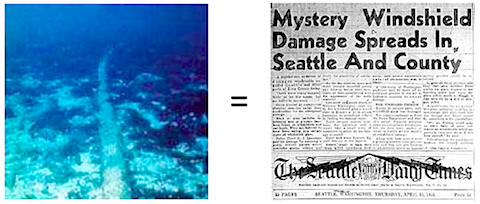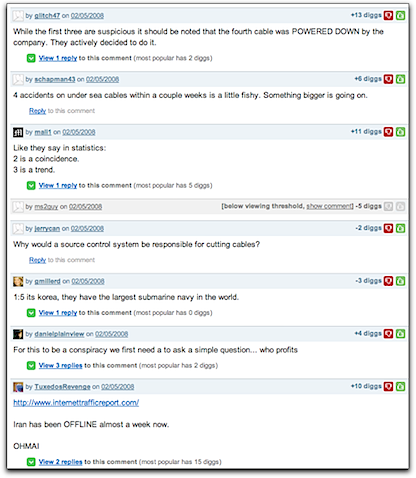Tag: stupid monkey brains
February 7, 2008
-
Who Cut The Cables?

The same people who pitted Seattle-area windshields in the spring of 1954.
Right now Techmeme is littered with people spinning wild theories on why “five undersea cables have been cut” in a short period of time.
Of course there have been some voices of reason as well.
It’s really worth spending some time reading the links above — particularly the comments — to see how people react when they receive a small piece of information that doesn’t fit into our every-day world-view.
Check out this digg thread for example:

This is fairly typical. A few people crying this must be a conspiracy and others wise cracking about “frickin’ sharks with frickin’ laser beams attached to their frickin’ heads” being the culprit.
Back in 2003 when SARS hit Toronto (in particular) causing mass hysteria, I posted a link to a great article about a bizarre rash of windshield pitting incidents in Seattle in 1954. For anyone getting caught up in the “cable cutting conspiracy”, this is a must read.
July 24, 2004
-
Thought
Everyone should read Barry Schwartz’s address to Swarthmore’s “Last Collection”. Schwartz is the author of Paradox of Choice another must read that introduced me to the idea of “maximizers” and “satisficers”.
I was going to pick a few quotes from the rather lengthy speech but found too many that were too long to quote without guilty. So just dive in yourself and come up with pearls.
(via Authentic Happiness’s Newsletter)
February 13, 2004
-
Thought
Should Spanking Still Be Legal In Canada? I think not. Alyson’s article explains why.
October 24, 2003
-
Thought
kottke.org: Guidelines for focusing on learning:
1. Release the need to be right.
2. Welcome one another’s thoughts and opinions.
3. Suspend judgment.
4. Listen for understanding, not rebuttal.
5. Make personal statements by using ‘I’ rather than ‘you’.
6. Clarify first what was said before you challenge someone.
7. Take time to reflect.
8. Lean into discomfort.
9. Respond first to what was said before making your point.
10. Have fun.
Jason goes on to point out how few of us to any of this.
September 28, 2003
-
Thought
Following up on Jon Udell’s “Mechanical Memory” post, I submit this quote from deep in a Globe And Mail article on Slow Schooling:
“U.S. developmental psychologists Roberta Michnick Golinkoff and Kathy Hirsh-Pasek’s book Einstein Never Used Flash Cards: How Our Children Really Learn — And Why They Need to Play More and Memorize Less hits bookstores next week. Prof. Golinkoff, who has spent her career understanding how the human brain works, decried the ‘roadrunner society’ that tells parents to accelerate children’s brain development.
Some earlier research has been misinterpreted, she added, to produce the notion that ‘if you don’t pour it in by the first three years, your kid is doomed. Your kid will never see Harvard.’ This idea that children must be constantly at work, she said, is folly: ‘We don’t need people who can spit back facts. We’ve got Google.’”
-
Thought
Jon Udell: Mechanical Memory:
“We all like to joke, nowadays, about how Google has become humanity’s collective memory, and we’re properly grateful not to have to remember a lot of things that we know we can just look up. We’ve gone through this before, of course. Pre-Gutenberg, we routinely memorized vast amounts of verse. Then we learned to offload chunks of memory to print. Now we’re learning to offload a whole lot more memory to the Net. I’m not saying I’d have it otherwise, but sometimes I wonder about the tradeoffs we’re making.”
April 16, 2003
-
The Seattle Windshield Pitting Epidemic
A fascinating recounting of a classic example of mass delusion known as The Seattle Windshield Pitting Epidemic.
While the story is important as an example of mass delusion, it is also interesting to note the lack of scientific awareness shown by the public and media.
While SARS is real, I felt an eerie connection between what is happening in Toronto with SARS and what happened with windshield pits in 1954. Of course, I’m not saying that SARS is a mass delusion, only that the public reaction to an(as yet) minor threat is out of proportion and unscientific.
Isn’t it hard not to have a moment of panic when someone coughs near you? Or when you shake hands with a stranger?
[via the always wonderful Boing Boing]
August 13, 2002
-
Thought
“Eight by Eight” looks like it is going out the window.
This NPR audio stream counters pretty much every myth about water that you didn’t know was a myth.
September 6, 2001
-
Thought
Move over Viral Marketing, “False Memory Marketing” is the next trend.
This extremely disturbing article in the Guardian points out that marketing can actually create false memories in consumers. Consumers “remember” using products that didn’t previously exist or having other childhood experiences because of advertising or product branding. For example, consumers report drinking bottles of Stewart’s root beer in childhood when it’s only been bottled for the last ten years. The bottles are marketed as “original”, “old-fashioned” and “Since 1927.”
Scary quote:
“This brings forth ethical considerations. Is it OK for marketers to knowingly manipulate consumers’ past?
“On one hand, the alteration will occur whether or not that was the intent of the marketer given the reconstructive nature of recall.
On the other hand, there are ways in which the marketer can enhance the likelihood consumer memories will be consistent with their advertising messages. At the very least, consumers ought to be aware of that power.”
Then again, maybe this isn’t news. I vaguely remember reading this same article when I was young. Someone, please reassure me that “Joe Louis” existed before 1975!